Filed under: Canadian Tire Fire, Featured
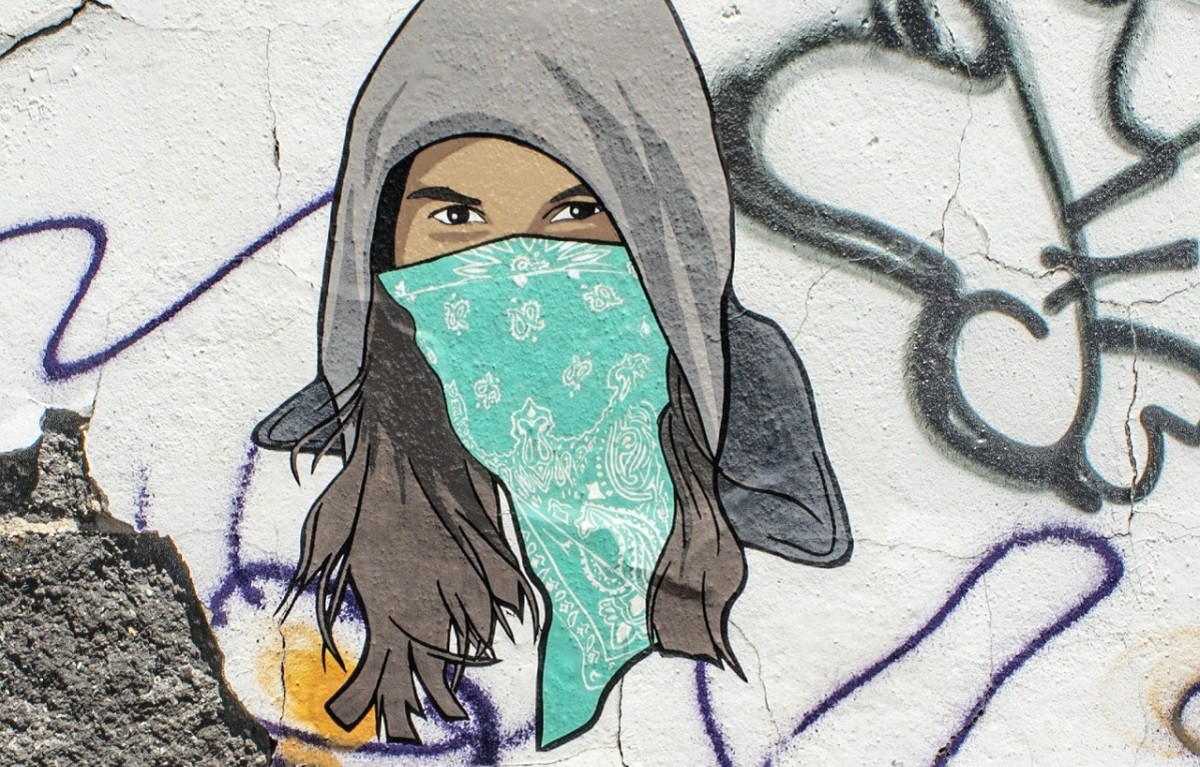
In our column this week, our main stories feature organizing in Vancouver against police brutality, the torching of RCMP vehicles in Smithers, a court victory for the Kahnistensera against McGill University, and an action against Line 9B in Montreal.
On October 27th, folks gathered in Toronto’s economic district to disrupt an event where RBC CEO Dave McKay was being awarded “Business Leader of the Year.” At the counter-event, McKay was awarded “Climate Villain of the Year.” RBC is the world’s 5th-largest funder of fossil fuel projects, and the largest in Canada. The demonstration included a 20ft effigy of McKay.
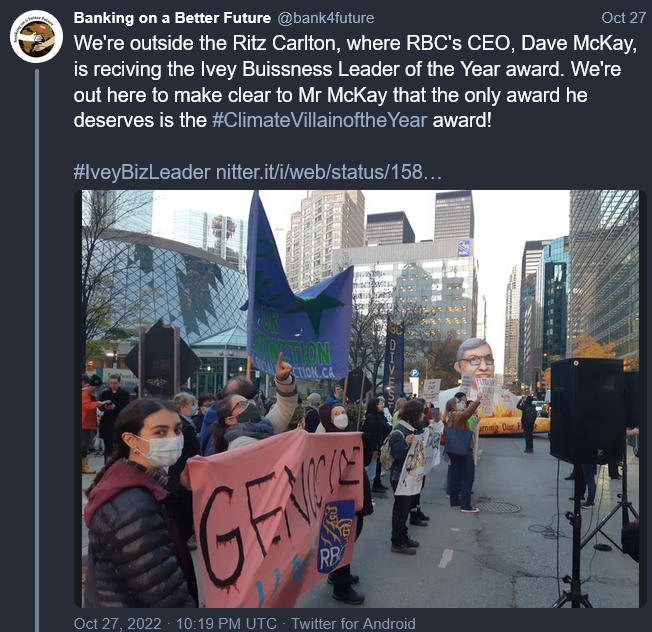
This week, news emerged of a Toronto man who fell to his death after a long interaction with police in his high-rise apartment. 32-year old Taresh Bobby Ramroop was in mental health crisis when police were called by other residents in his apartment building. Witnesses estimate that around 20 police were present when he died. His family arrived at the building after receiving texts from Bobby saying that he needed help, but were forced to wait in a locked superintendent’s office for hours. They are now calling for the release of police bodycam footage and the names of the officers involved, as well as the abolishment of the Toronto police.
In class war news, since October 19th, 1,500 part-time academics and TAs have been on strike at Dalhousie University. Their union, CUPE 3912, says the main point of contention with the university has been over wages, which have not kept up with the cost of living. On Monday October 31st, a student walkout is expected in solidarity with striking workers.
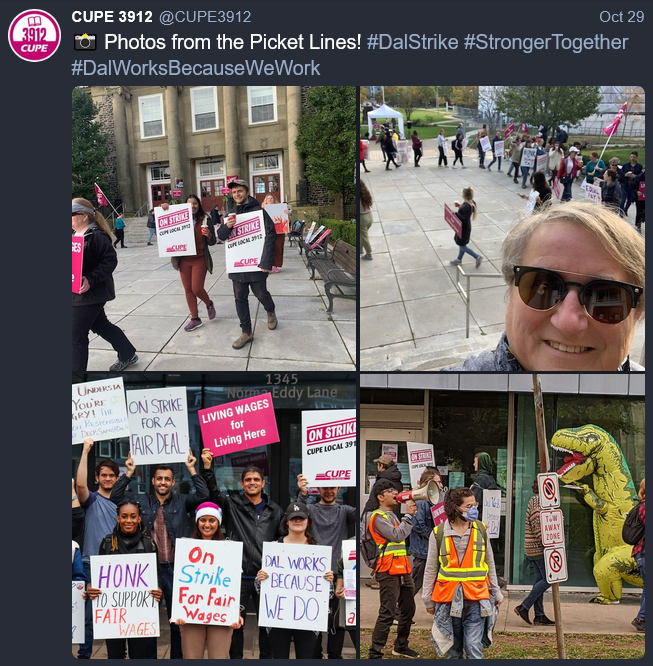
The remaining 14 tenants in a Montreal building that has been turned into a construction zone are organizing against renoviction. Anarchists have been supporting the tenants under the banner of the Montreal Autonomous Tenants Union. One member wrote a sum up of the situation, which you can read here.
Read on for this week’s full stories!
RCMP Vehicles Torched on Wet’suwet’en Territory, Updates on CSIS Surveillance of Struggle
The morning of October 26th held a rude awakening for cops and industry in Smithers, BC, who woke up to news of 8 torched vehicles, including 4 cop cars in the parking lot of a hotel. One of the burnt police vehicles was a C-IRG (Community-Industry Response Group) car, an RCMP branch specifically tasked with policing movements against extractive industry. It is likely, however, that all RCMP vehicles there have been involved in some way in repressing, surveilling, and harassing the land defenders on the yintah who have been fighting CGL for years. When preparing for raids of camps on the yintah, police are often staged at hotels in Houston and Smithers.

Despite the fact that nobody has claimed the action and no official motive has been established, it appears obvious that the action was taken as part of the struggle against CGL and against the colonial police attempting to force the pipeline through Wet’suwet’en land. As police investigate, we hope for the safety of whoever took this brave action, and for the continued decline of police morale in the face of this resistance!
Shortly after news of the Smithers action came out, a CBC investigation revealed more details of the surveillance of 2020’s Shut Down Canada rail blockades. CSIS, the Canadian Security Intelligence Service, was evaluating behind the scenes whether it would be viable to classify Indigenous activists as terrorists for participating in train blockades in solidarity with Wet’suwet’en. In March 2021, as part of a counter-terror briefing with government officials, the Integrated Terrorism Assessment Centre (ITAC) reported that “Unsophisticated acts of unlawful interference [like blockades] do not cross the terrorism threshold. Although these disruptive actions are damaging to the economy and to rail network operations, they have not yet amounted to acts of terrorism.”
CSIS raised concerns both about the struggle against CGL and its country-wide support actions, but also about 1492 Land Back Lane, the victorious occupation of a would-be housing development by Six Nations land defenders. As well, they were concerned about “anarchist interference” in these and other Indigenous-led movements, saying that while not technically terrorists, Indigenous land defenders and their allies are “ideologically motivated violent extremists” who warrant state surveillance.
It can be very useful to know bits and pieces of how the state is evaluating anarchist and anti-colonial movements. However, it can also be stressful and paranoia-inducing to consider the lengths that the state is likely going to to attempt to quash these movements. Attempts to paint anarchists as outside agitators with nefarious intentions piggy-backing off of Indigenous-led movements is an old strategy which serves only to scare people out of participating in struggle and weaken relationships of solidarity. Let’s stay strong in the face of repression, keep up the fight, and not allow the state to weaken our bonds of solidarity or our resolve.
Vancouver Against Police Brutality
On October 22nd, people in Vancouver gathered to mark the International Day Against Police Brutality. The event was co-hosted by Defund 604 and Justice for Jared, a group fighting for an end to police violence in the memory of Jared Lowndes, a Wet’suwet’en man murdered by police last year.
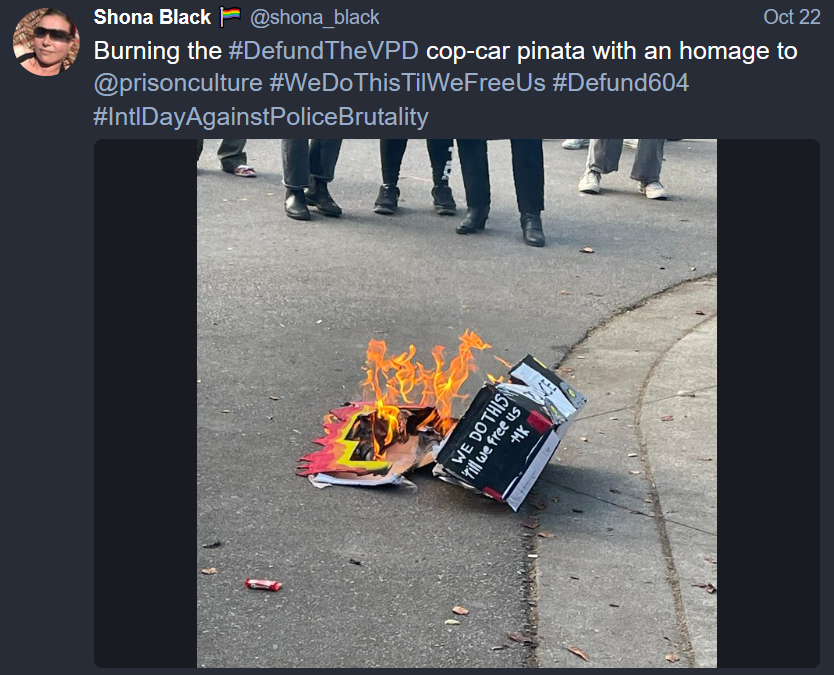
The event is timely, following the election of a law-and-order mayor who has promised to hire 100 new cops in Vancouver earlier this month. The same week, Vancouver Police were invited to an apology ceremony hosted by the Heiltsuk Nation with the intention of moving forward from an act of violence against two of the nation’s members.
In 2019, two Vancouver police officers handcuffed an Indigenous man and his then-12-year-old granddaughter on a busy Vancouver street, after a bank where they were trying to open an account wrongly assumed they were using a fake status card and called police. The officers were expected to attend the ceremony and apologize, as one piece of a settlement in a human rights complaint filed by the Heiltsuk Nation. However, the officers chose not to attend, in a move Heiltsuk Nation members called hurtful, angering and disappointing.
This week video was also circulated of Vancouver Transit Police violently restraining a woman in a Vancouver transit station. While the police say that the officers attempted to use de-escalation techniques, witnesses state that police tackled the woman to the ground with no communication, and used a taser gun on her multiple times. In videos, police can be seen kneeling on the woman, who witnesses say appeared to be in mental health crisis, while she begs for them to stop and says she is not resisting.
Stop police brutality! Abolish the police!
Kanien’kehà:ka Kahnistensera Win Injunction Against McGill University, Supporters Continue to Organize
In our last issue we covered the ongoing struggle against the renovation of the Royal Victoria Hospital grounds and building by the Kanien’kehà:ka Kahnistensera, or Mohawk Mothers. Since then, the Kahnistensera represented themselves at the Quebec Superior court asking for an injunction to stop the construction, on the grounds that there may be unmarked graves, including graves of Indigenous children, at the site. The Kahnistensera faced off against lawyers for McGill University, the Société québécoise des infrastructures, the City of Montreal and the Attorney General of Canada.
In a surprising development, out of keeping with the overwhelming pattern of injunctions being used against Indigenous groups and being denied to those Indigenous groups who seek them, the Kahnistensera were granted a temporary, emergency injunction by the judge, immediately stopping the work. Though some excavation had already been done by archeological firm Arkéos, further work will be halted, leaving time for the potential use of non-invasive archeological methods to investigate the presence of remains at the site.
HISTORIC WIN FOR #MOHAWKMOTHERS : Judge rules that @mcgillu must stop excavation at the #newvic in the short term (3-4mo) for parties to continue to negotiate outside of court. Hugs, tears, joy shared in the courtroom. More details to follow.#stopthenewvic pic.twitter.com/JybpBuD7Jl
— stopthenewvic (@stopthenewvic) October 27, 2022
Before the court decision, another solidarity action took place. This one was an “artistic intervention” on the grounds of the Royal Vic. According to a communique, “We arranged childrens’ shoes and clothing, assembled tombstones labelled “unknown” with flowers, and lined the area with “crime scene” tape because McGill and Arkéos are actively going against the kaia’nereh’ko:wa (Great Law) by digging up potential unmarked graves against the Kahnistensera’s wishes. This space should be considered as the crime scene that it is.”
The communique also stated “We also want to empasize that Kanien’kehà:ka sovereignty on this land goes well beyond this current campaign. Some land acknowledgment in McGill’s official communication is not enough. We support the Kahnistensera’s broader vision of a university which has been renamed to not pay homage to James McGill, a colonial slaveholder. We also agree with the Kahnistensera that McGill should at the very least repay its financial debts to the Rotino’shonni peoples, and stop all military research, in accordance with the Kaia’nereh’ko:wa.”
You can follow @stopthenewvic on Twitter for updates.
Action Against Line 9B in East Montreal, Banner Drop in Chicoutimi in Solidarity
On October 20th, around 20 activists from Collectif Antigone blocked access to a fuel loading site at the Port of Montreal, demanding the closure of the Enbridge’s Line 9B pipeline. The pipeline transports up to 300,000 barrels of crude oil a day from Hamilton to Montreal. The 20 activists arrived early in the morning and used various methods to shut down access to the area. Several climbed a loading tower and several others locked themselved within a shipping container at the entrance to the port.
The action was aimed primarily at drawing attention to the threat to drinking water caused by the pipeline, which crosses multiple rivers. It lasted about 23 hours, at which point the last activists were arrested.
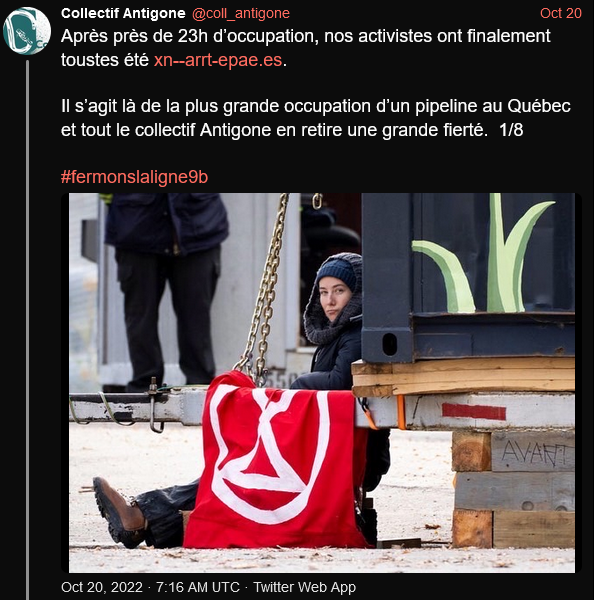
In Chicoutimi, a banner drop took place in solidarity with the blockaders. The communique read:
We wish to underline the urgent need for action in the face of climate change, which is real and directly threatens biodiversity as well as the health of millions of inhabitants of the territory of Quebec.
This action is undertaken in support of the ongoing blockade, in Montréal-Est, of the supply of diluted bitumen to oil tankers from the largest pipeline in Quebec, Enbridge’s line 9B.
Follow Canadian Tire Fire here. Cover photo from Montreal Counter-Info.





